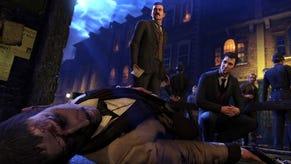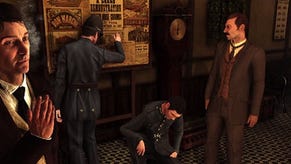Have You Played... Sherlock Holmes: Crimes and Punishments?
Watson, the game is a bit silly
There is a moment in Sherlock Holmes: Crimes and Punishments where the detective has to identify a brand of cigar. “This scent is familiar to me, but in order to recognise it, I must combine my associations into one picture,” he says. You find yourself swivelling a stink cloud, aligning its wafting lines into a hidden image. Problem is, Holmes’ nose deals in broad stereotypes - it locates the stogie as Mexican in origin by arranging the smell into a picture of a sombrero. That legendary sombrero smell that all Mexicans have. I believe this one comes from Conan Doyle’s beloved story, The Case Of The Horribly Misjudged Minigame.
Whenever Holmes isn’t interpreting racist smells, he’s engaged in some other daft distraction. He picks locks, twiddles with bunsen burners, spot microscopic clues on suspects, arm wrestles, harpoons a sheep's carcass… the list goes on. He’s less a man than a collection of minigames stuffed into a deerstalker. I’m amazed we don’t have to manually palpate his heart or seize control of his lungs to take great big sucks from that iconic pipe. The constant parade of carnival games either speaks to a lack of faith in the central mysteries, or a lack of understanding of the kind of brain that would want to play a Sherlock Holmes game in the first place.
And the annoying thing is, this noise and nonsense distracts from a sound deductive core. All the evidence you amass collects in a mind palace-ish space where you physically connect facts to create new deductions and further avenues of investigation. The clever part is that based on how you interpret each fact (they tend to offer two potential readings) you can technically create a watertight case against the wrong person. As long as all the evidence is accounted for in a version of events, it doesn’t matter if it’s the version of events.
Further to this, you then get to decide whether to hand the culprit in or confront them in private and let them off. It’s entirely possible to pick the wrong person and then magnanimously turn a blind eye, which must be quite bemusing for the not-culprit. Once the case is closed you can ask the game to reveal if your decision was right or not (presumably to allow for opportunity to replay), but I’d personally rather not know. After years of snooty, competent Sherlocks I love the idea of a blithering idiot sending the innocent to the gallows at the behest of his racist nose, and still being London’s most celebrated sleuth.







